
views
Changing Your Style

Wear clothes that make you feel comfortable. The clothes you wear can really have an effect on your self-esteem. For example, wearing a superhero costume can boost confidence and make people feel stronger; women perform better on a math test in a sweater than in a swimsuit; and a white coat gives people more “mental agility.” Focus on wearing clothes that make you feel comfortable, such as a nice soft sweater, your favorite jeans, and a suit and tie (or something else professional looking). Examine your wardrobe and make sure your clothes fit your style. If they don’t, you may need to go shopping! If you dislike shopping in public or don’t know what is in style, consider a service that selects clothes for you and sends them to your house or find an online retailer with an easy free return policy. Wear colors that you like. Doing so will help boost your mood. If you can’t decide on a color you like, a good go-to color is blue because people general respond positively to it.

Wear clothes that accentuate the physical features you like. Find outfits that will look good to you when you look in a mirror because they match your body type or include accessories that show off your good features. There is no perfect body type, but there are good and bad clothes for particular body types. Clothes that fit because they match your type are more likely to look good on you. If you are very skinny, avoid wearing dark colors, such as black, which are slimming. Wear lighter colors instead. Slim women should try to create some curve by belting a flowing dress in the center. Thin men should avoid wearing large or baggy clothing to add the appearance of bulk; dressing in the appropriate size will look better. If you have broad shoulders and narrow hips, avoid scarves with patterns (calling attention to your shoulders), shirts that accentuate your shoulders, and footwear that looks small for your body type, but do wear pants that make your hips look bigger and shoes with wider heels or boots with buckles that call attention to your feet. If your body is pear-shaped, wear bright colors or patterns on top and dark, solid colors on the bottom and avoid horizontal stripes, particularly on the bottom. If you have a round body type, avoid too much fabric in the middle of your body, belts, and skirts less than knee-length, but do wear details above your bust line and below your hipline. If you have a curvy body shape, try clothing that is skinny at the waist but flowy at the top and bottom. This will accentuate your curves and downplay your legs a bit.

Wear clothes in the appropriate size or have them tailored. Wearing clothes that fit you at your current weight and height will make you feel better about the way you look, even if the clothes are not the ideal size you want to be. Special order clothes in sizes that actually fit you. If you are a very tall and skinny man, for example, you may need to order Medium Tall sizes online rather than settling for clothing in the store that is too wide and baggy on you because it is the appropriate length. Have clothing tailored for length or width to fit you well. Tailors also know tricks like adding darts (folded sections of fabric that create a flattering shape) to clothing to accentuate positive features such as curves.

Wear the right lipstick. Using lipstick well means more than just selecting the right color; it also means taking care of your lips as a part of your overall look by exfoliating (eg, with a mixture of salt and almond oil) and applying balm twice a week. For the lipstick itself, makeup artists recommend the following: Avoid lipstick that shimmers and sparkles because it tends to look cheap Choose a bright color based on your lip color (eg, pale lips=cherry lipstick, natural=cranberry, and dark lips=burgundy). Choose a nude color based on your skin tone (choose something slightly brighter or deeper than your skin). Avoid blue or black based shades, as they tend to make you look older, more severe, and yes, even scarier (think vampire). Liner is not necessary, but when you use it, pick a color that matches your lips, not the lipstick. Apply lipstick carefully then smudge the border slightly for a softer effect. Apply starting in the center and then blend the color towards the corners, careful not to apply directly to the corners of your mouth. Apply strong lipstick shades to the bottom lip and then press your lips together for a lighter application. Apply lipstick once, blot your lips on a tissue, and apply again for a longer lasting effect.
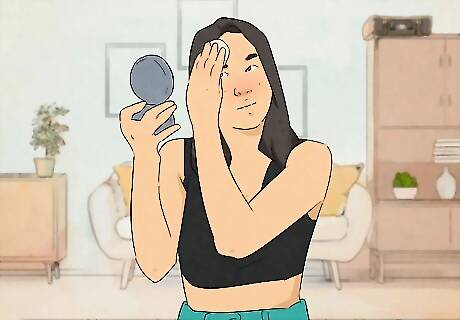
Apply make-up based on your face shape. Although makeup is not for everyone, those who use makeup can improve their self-image by becoming more educated on how to use makeup to improve their confidence in their looks. Just as with clothes, the goal is to match your shape (in this case face shape) and direct the eyes to the features you want to accentuate. To determine your face shape, pull your hair back and look in the mirror at your hairline and chin: Heart-shaped faces (broad forehead and pointed chin) should draw focus away from their prominent chin and cheekbones with soft tones on the face and color on the lips. Rounded faces (forehead and lower face are the same width) should help add definition using makeup on the cheeks and eyes (eg, using smoky eye shadow). Square faces (Angular jawbone and hairline) should use soft colors on the skin, mouth, and eyes to soften facial features. Oval faces (forehead and lower face are same width with longer sides) should apply blush with horizontal strokes and define their eyes and lips to reduce the length of their face.

Get a good haircut. A great haircut from a stylish salon or respectable barber shop can make you feel more confident about your looks and will give you a more up-to-date, fashionable style. As with makeup, the key to a good hairstyle is to match the shape of your face: Heart-shaped faces should consider bangs and side-parts with chin-length hair that helps to round out the face more. Round faces should consider a center or slightly off-center part and “face-framing layers” that minimize the fullness and create “a more chiseled illusion.” Square faces should consider “face-framing layers” and a side-part that draws attention to the cheekbones. Oval faces should find that most styles work for them as the techniques for other face shapes are meant to make the face look more like oval-shaped faces.

Stay well-groomed. Looking like you thought about your appearance and are taking care of yourself can boost your confidence and can be achieved with a few simple grooming tips: Keep your nails trimmed and shaped neatly (women and men can benefit from this tip). Be sure your nail beds are clean. Brush your teeth several times daily, particularly after meals with tooth-gunk potential. Keep moist wipes and cleansing cloths with you to clean off makeup, sunscreen, and sweat, or just to refresh yourself after a few stressful hours. Make sure to also do a full facial wash every 2 to 3 days to keep your skin clear. Use an anti-aging moisturizer, sun protector, and concealer (to even out skin tone). Use your fingers (as opposed to brushes) to apply makeup and get a better feel (literally) for how much makeup you are applying that can lead to a more natural look. Use press-on nails for a quick manicured look. Even for people who experienced the 80’s, they are more socially acceptable today than you might realize! Apply a deodorant or antiperspirant regularly. Use natural oils (eg, avocado, coconut, or almond) to keep your body and hair moisturized.
Improving your Appearance Self-Esteem

Identify the source of your lack of confidence. Figuring out why you lack confidence can help you target those feelings. Start writing a "self-esteem" journal, where you note when you feel more and less confident about the way you look. After a week or two, look back at your notes and try to find patterns to the way you feel. Were you more confident in any of the following situations: after spending more time grooming or getting ready, if you dressed a certain way, spending time in smaller groups, spending time away from certain individuals, or spending less time on social media or looking at celebrity media? Are there any "bigger" issues, such as your employment status or personal troubles that seem to trigger your feelings of low confidence? Some people turn this type of anxiety towards their self-perception, which may seem easier to deal with than the “bigger” problem of job security or personal problems. If you don't see any patterns or you're still not sure what is causing your lack of confidence, you may want to try a number of different tips to find what seems to help the most.

Address your body image perception. Dr. Vivian Diller has a number of different cognitive-behavioral techniques for improving your confidence in your looks, which she calls “beauty self-esteem.” These techniques focus on evaluating the source of your self-esteem, questioning your negative opinion of your looks, and thinking about ways to think about your looks more positively. Focus on sitting up straight with your chest pushed out while doing the following steps for maximum confidence.

Write down your positive attributes. Write the 3 things about your looks and the 3 things about your personality that you like the most. Place all 6 items in order of importance and write 1 sentence about each. For example, “I help others. I volunteer every week for a local charity and always call my friends back right away when they need to talk.”
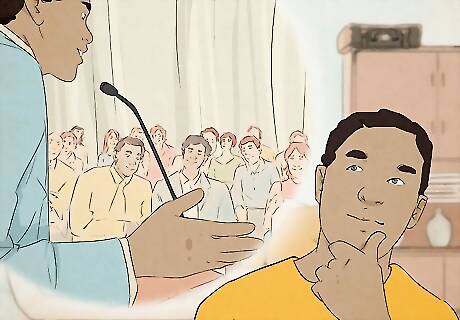
Analyze your positive attributes. Notice where the physical features ranked relative to your personality features; most people rank personality features above physical features, which emphasizes not only that our self-esteem is influenced more about how we feel about our personality but also that others’ opinion of us is likely more influenced about personality too.
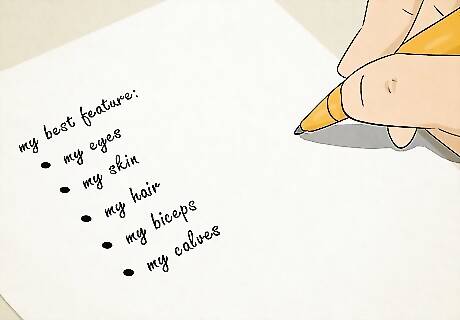
List your best features. Write down the 3 physical features that you think are most appealing to you, using a sentence to describe each one. For example, “My long curly hair - especially just after I leave the hair salon and looks so full and bouncy” or “My broad shoulders, especially when my girlfriend puts her head on my shoulder for comfort.” This exercise shows that everyone has features they can be proud of. These features can be accentuated by clothing choice.

Look in the mirror. Look at yourself in the mirror and see what thoughts come into your head. Whose words are they: your own or someone else’s? Whose words do they remind you of: a bully’s, a parent’s or a friend’s? Question the accuracy of the words in your head: Are your muscles really smaller than most people’s? Are your hips really that big? Are you really that much taller than other people? Do any of those things really matter? Think about how you would talk to a friend. How is it different than your self-talk, and how can you get yourself to think positively about yourself instead of using the critical or negative tone you likely used to begin with? Find what you like about yourself in the mirror and from now on, whenever you look in the mirror, look at this attribute rather any perceived negative attributes you normally focus on.
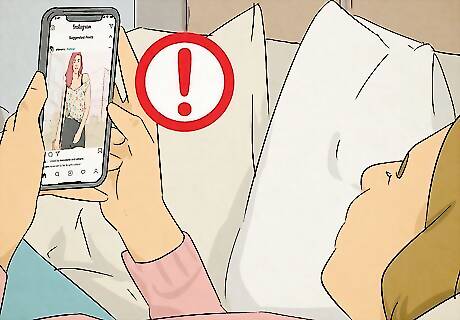
Be skeptical of the media. Remember that the media portrayal of the body is designed to make you feel bad about yourself because that is what gets you to buy products and new clothes. Not only are the body images portrayed not average, they are often helped by digital enhancement using software like Adobe Photoshop. People who recognize this and are more media savvy often have better self-perceptions.

Work on positive re-framing. If you find yourself having negative thoughts about the way you look, stop yourself and re-frame it as something positive. For example, if you think your nose is too big, stop and remind yourself that you have a strong, unique profile. If you think you are overweight, think about your awesome curves and plan what lifestyle changes you can make.

Keep a confidence journal. Every night before you go to sleep, write down 3 positive things about yourself. Then in the morning, read them and add two more. It's okay to repeat what you have said before. The more positive self-thought you have, the better your overall self-esteem will become.

Seek counselling. If your negative self-perception persists, you may want to consider seeing a therapist. Your thoughts about the way you look may be related to deeper issues that you're not fully aware of, and counselling can help you have a healthier self-esteem in general.
Improving Your Quality of Life
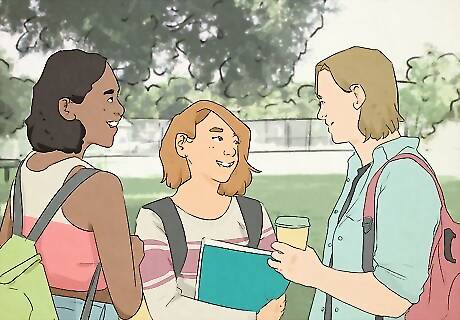
Choose your friends wisely. Pay attention to your friends and how they make you feel. Surround yourself with people who don’t criticize or judge you because it can negatively affect your body image. Friends can even help you work towards your health and fitness goals, which may help you feel more confident in your looks as well. Find a gym partner or a hiking buddy.

Smile and laugh as much as possible. As easy and obvious as it sounds, smiling, even when you are forced to do it, can lower stress and make you feel better about yourself. Furthermore, people will see you as approachable and trusting.
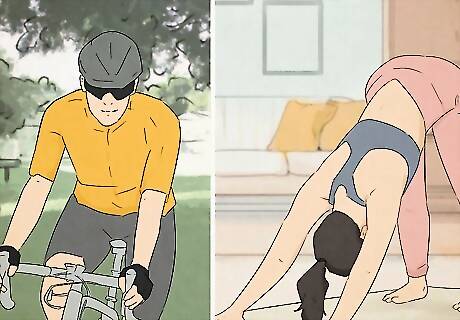
Exercise regularly. Whether or not exercise actually changes your physical appearance, it can change your perception of yourself, which can lead to increased self esteem. A national survey of physical activity and weight has shown that people who were not satisfied with their body size were less likely to be physically active, regardless of how much they actually weighed. This finding suggests that just being physically active can be related to a better self-image. The amount of exercise needs to be enough to give you a sense of accomplishment and needs to be regular, but does not need to be any specific type of exercise or be done for any specific amount of time.

Eat a healthy diet. Certain foods, such as those high in carbohydrates and sugar, can cause you to become sluggish and negatively affect your mood. Foods that can improve your mood are those that are low in fat and release their energy slowly. These foods give energy for sustained periods of time and do not carry the risk of weight gain, bloating, and irritability; they can also lead to stronger hair and nails, which can improve your overall self-image. Avoid eating foods that are sugary, fried, or overly processed. Eat more nuts and seeds, legumes, and fresh fruits and vegetables, particularly produce with vibrant, rich colors.
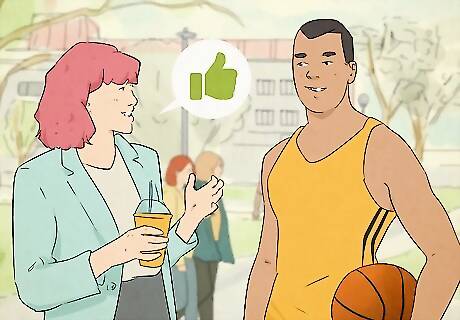
Take a compliment. If you get a compliment, don’t deflect it, take it! If you are uncertain about your looks, it may feel awkward to get compliments and your anxious reaction might be to deflect or down-play the compliment. For example, if someone compliments your shirt, you might tell them it is a hand-me-down that you only wore because all of your other clothes are dirty. This is a reflection of your anxiety about your looks and can make both you and the person who complimented you uncomfortable. Instead, just say thank you and fully enjoy the compliment you earned.













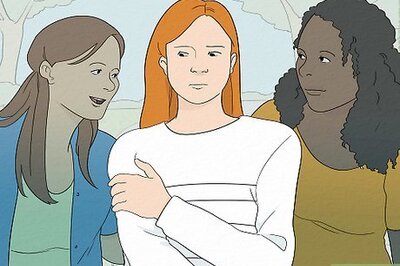
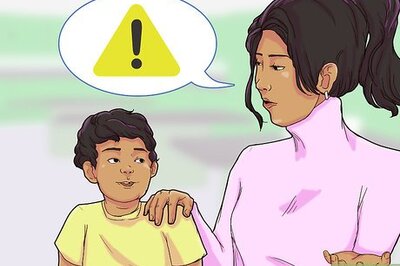
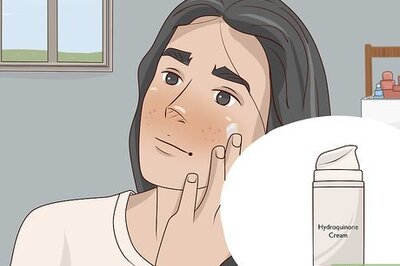
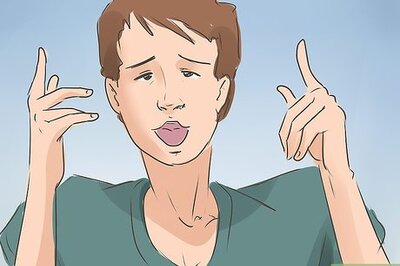

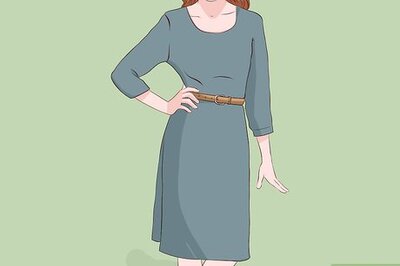

Comments
0 comment